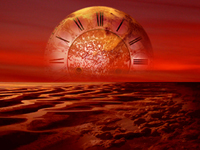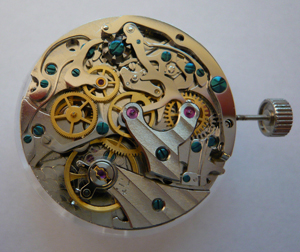
Your complimentary articles
You’ve read one of your four complimentary articles for this month.
You can read four articles free per month. To have complete access to the thousands of philosophy articles on this site, please
Books
Experiencing Time by Simon Prosser
Heather Dyke passes time reading about a denial of the passing of time.
If there’s one thing we can all be sure about when contemplating the nature of time, it’s that time passes, right? Whether we’re busily engaged in daily tasks, quietly absorbed in a book, watching a sunset, remembering an awkward encounter, or looking forward to a holiday, our experience tells us that time flows. We approach the future, leaving the past behind us, always occupying the present, although the present is constantly changing. This, we feel sure, is the nature of our temporal experience; and on the basis of this experience we infer that these descriptions correctly describe the nature of temporal reality. That is, we take our experience as of time flowing to be veridical – we have no reason to think we’re being deceived – so we conclude that time really does flow.
Simon Prosser, a lecturer in philosophy at St Andrews University, rejects this conclusion. He thinks that time doesn’t pass, or flow.
So what does Prosser think is wrong with this argument? He doesn’t deny that we have experiences as of the passage of time, but he does deny that the only, or even the best, explanation for this is that time really does flow. Experiencing Time (2016) is an extended (and opinionated) defence of his position. Prosser carefully explains unfamiliar terms and issues as they arise, making this an excellent introduction to issues in both the philosophy of time and the philosophy of mind for the general philosophical reader.

Chapter 1 begins by outlining the central debate in the philosophy of time. Taking their name from the philosophy of time of John McTaggart, ‘A-theorists’ believe that time as it is in itself, and not merely as it seems to us, includes a distinction between past, present and future. Furthermore, what is past, present, and future is constantly changing, because time is dynamic. However, Prosser is a ‘B-theorist’, so he rejects both of these claims. He thinks that there is no objective distinction between past, present and future, and that time is not dynamic. Instead, events and moments in time are related to each other by the temporal relations of precedence, subsequence, and simultaneity. B-theorists don’t deny that things change, but for them, change is the variation in properties over time, which independent of our perception of it doesn’t flow, but rather exists. Neither do B-theorists deny that we all recognise a distinction between past, present and future; but they think that this says more about us and our perspective on time than it does about temporal reality itself.
One way of grasping the distinction between the A-theory and the B-theory of time is to imagine a sequence of events and to think about how that sequence of events occupies time. So, imagine the entire history of the universe, stretching from the Big Bang through the formation of our Solar System, through prehistoric times, recent events, events going on right now, on into the unknown future. One way of thinking about this series is to think of each event as located in either the past, present or future, recognising that they can be further ordered in terms of whether they’re in the distant past, near past, present, near future, or distant future. This is how the A-theorist thinks that events occupy time. But we can also think of the very same sequence of events as standing in temporal relations to each other. Every event in that sequence is either earlier than, later than, or simultaneous with every other event. When we order the sequence of events in this way, this series presents no distinction between past, present and future, and especially no privileged present. Furthermore, there is nothing dynamic about this series; it is a static series: it eternally exists. This is how the B-theorist thinks events occupy time.
Notice however that when considering these two different ways of ordering events in time, we’re imagining the very same sequence of events. Whether we think of it as an A-series or a B-series, the entire history of the universe contains the very same physical events in the very same order. Prosser uses this fact to develop his ingenious argument that we couldn’t experience time passing even if time really did pass. The argument comes in two versions: the detector argument, and the multi-detector argument. I will focus here on the detector argument, which “shows that experience fails to favour the A-theory over the B-theory; the multi-detector argument shows that the passage of time cannot be experienced at all” (p.33).
The detector argument asks whether there could be “a physical device that could detect whether or not time was passing, and thus tell us whether or not the A-theory was true.” (p.33) Perhaps a light would illuminate when the device detected the passage of time. But recall that the A-series and the B-series contain the very same physical events in the very same order. It follows that if the light on the detector illuminates at all, it will illuminate in both A-series and B-series time. So no physical device could detect the A-series’ passage of time. Prosser further argues that, on any acceptable view of the relation between mind and body, “if no physical system can detect the passage of time, then neither can the human mind” (p.35).
Prosser spends Chapter 2 motivating, developing, and defending his detector and multi-detector arguments. His aim is to undermine the A-theory which, he claims, relies almost entirely on the fact that experience seems to tell us that time flows. But if his detector arguments are successful, then the passage of time cannot possibly be experienced. This arguably deals quite a blow to the A-theory, although it is still open to A-theorists to deny that experience is their principle motivation. Indeed many A-theorists appeal not to the nature of temporal experience, but rather to the fact that their view best articulates commonsense beliefs about time. (See for example, T.M. Crisp, ‘Presentism’, in The Oxford Handbook of Metaphysics, 2003; N. Markosian, ‘A Defense of Presentism’, Oxford Studies in Metaphysics 1(3), 2004; D.W. Zimmerman, ‘The Privileged Present: Defending an “A-theory” of Time’ in Contemporary Debates in Metaphysics, 2008.)

Having dealt what he takes to be a mortal blow to the A-theory, in the rest of the book Prosser turns to developing B-theory explanations for various elements of our experience that would otherwise seem to favour the A-theory. In Chapter 3 he discusses why we think of events as past, present and future, and why our attitudes and emotional responses to events vary depending on whether those events are past, present, or future. We all recognise that we would feel very differently about a painful trip to the dentist if it was future rather than past, for example. In Chapter 4 he develops a B-theoretic account of the fact that we experience events and processes as taking place at different rates, and as having duration. He also gives an account of the widely reported phenomenon that under certain circumstances, time can seem to speed up or slow down. For example, people often report that time seems to slow down in a critical situation, such as a car crash.
Chapter 5 examines the question of whether experience is temporally extended. Unlike the other elements of temporal experience Prosser discusses, this discussion seems largely independent of the A-theory/B-theory debate. Prosser develops a “dynamic snapshot theory” (p.123) of temporal experience, which stands in opposition to the traditionally more dominant view that our experience is contained in a ‘specious present’ – that is, a short but finitely extended temporal duration.
In Chapter 6 Prosser asks, if time is not dynamic, why do we seem to experience change as dynamic? His answer is that experience misleadingly presents objects as enduring through change, that is, as existing wholly and completely while undergoing changes in properties. Instead of the whole object enduring through change in this way, Prosser thinks objects are temporally extended entities, having different temporal parts that possess different properties at different times. He says that they perdure. On the endurance view, a ripening tomato is a three-spatial-dimensional entity that exists wholly and completely at all the times it exists, and at earlier times it possesses the property of being green, while at later times the very same tomato possesses the property of being red. On the perdurance view, a ripening tomato is a temporally extended four-spacetime-dimensional entity that has earlier green parts and later red parts.
Finally, in Chapter 7, Prosser discusses two further features of our temporal experience that he believes contribute to our sense that time passes. These are firstly the sense that we are moving through time, or that the future is approaching us, and secondly the sense that the future is open – that it is as-yet undetermined. He suggests that there are features in common between the ‘approach’ of a future event, and the approach of a moving physical object, and that these common features may help “explain why we use so many motion-related metaphors when talking about time” (p.xi) without these being anything more than metaphors. He explains the apparent openness of the future in terms of the perspective from which we experience the world.
Experiencing Time is a provocative, engaging and yet accessible exploration of the many different elements of our temporal experience, while at the same time being a stalwart defence of the B-theory of time. Prosser does a sterling job of attempting to reconcile his preferred theory of time with the many features of our temporal experience that apparently conflict with it. He draws not just on work in metaphysics and the philosophy of mind but also on recent empirical work in psychology and cognitive science. This is a must-read for anyone interested in the philosophy of time and the psychology of temporal experience.
© Dr Heather Dyke 2018
Heather Dyke has taught philosophy at Otago, NZ and at the London School of Economics.
• Experiencing Time, by Simon Prosser, Oxford UP 2016, 240 pages, £40 hb, ISBN: 0198748949









